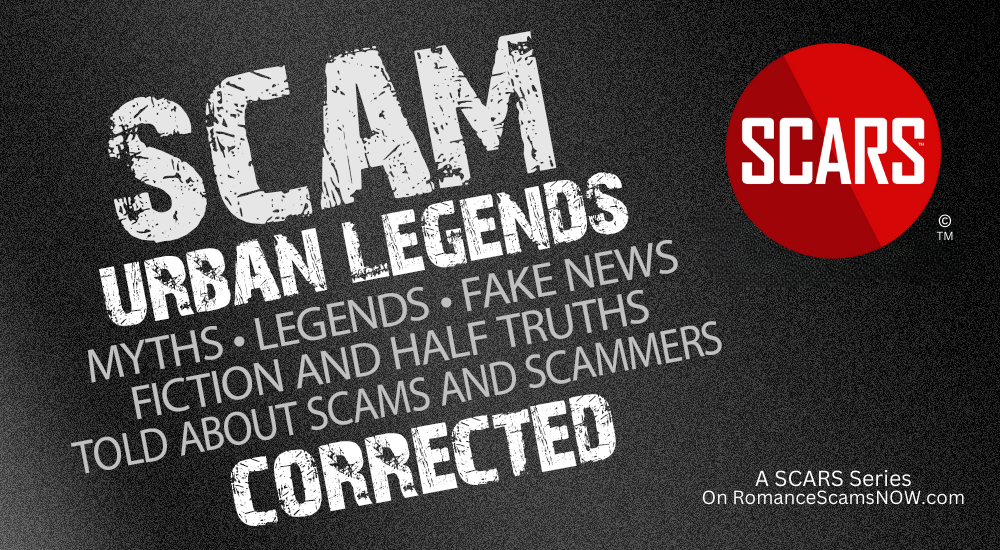Author:
• Tim McGuinness, Ph.D. – Anthropologist, Scientist, Director of the Society of Citizens Against Relationship Scams Inc.
Article Abstract
The urban legend that individuals are too small to be hacked or scammed persists due to various misconceptions and cognitive biases.
People often underestimate the prevalence and sophistication of cyber threats, assuming they are immune to such attacks. This false sense of security stems from optimism bias, lack of awareness, and trust in online platforms’ security measures.
Additionally, individuals may minimize the risk of being targeted, believing they have nothing of significant value or are not engaged in high-risk online behavior.
However, cybercriminals exploit vulnerabilities indiscriminately, utilizing automated tools to target as many individuals as possible. As a result, everyone is susceptible to cyber threats, regardless of their perceived size or importance. Recognizing the realities of cybersecurity and adopting proactive measures is crucial for protecting oneself from falling victim to online scams and hacks.

The Urban Legend Myth of Being Unworthy of Cybercrime: Why You’re a Target Regardless of Size
In the world of cybercrime, there’s a prevailing urban legend or myth that individuals or small entities are immune to being targeted.
The urban legend continuously circulates that unless you’re a high-profile organization or possess significant wealth, hackers, scammers, or cybercriminals won’t bother with you, but this is really just denial. This urban legend or assumption couldn’t be further from the truth. In today’s interconnected world, everyone holds something valuable to cybercriminals: their personal information.
Just consider this: your Social Security number, credit card details, and other private data are like gold nuggets in the digital realm. Even if you perceive yourself as “small potatoes,” your data remains a lucrative target. Cybercriminals aren’t discriminating based on size; they’re after any information they can exploit for financial gain.
Data breaches are rampant, affecting organizations of all sizes. Your information may be stored or used on various platforms, from government websites to online shopping portals. Despite feeling secure, these platforms are not immune to breaches. Once your data is compromised, it becomes a commodity in the underground market, where it’s bought, sold, and traded among cybercriminals.
Moreover, automation has revolutionized cybercrime. Automated tools scour the internet, hunting for vulnerabilities and valuable data across countless targets simultaneously. This means that even if you perceive yourself as insignificant, automated processes can still expose your sensitive information to malicious actors.
Why Do People Believe This?
The urban legend belief that one is too small to be hacked or scammed stems from several misconceptions and cognitive biases that individuals commonly hold:
- Optimism Bias: Many people possess an inherent optimism bias, which leads them to believe that negative events are less likely to happen to them personally. This bias can lead individuals to underestimate the risks associated with cyber threats, assuming that they are immune to such attacks.
- Lack of Awareness: Some individuals may simply be unaware of the prevalence and sophistication of cyber threats in today’s digital landscape. Without a clear understanding of the risks, they may naively assume that cybercriminals only target high-profile organizations or wealthy individuals.
- False Sense of Security: Individuals often place their trust in the security measures implemented by online platforms and service providers. They may believe that as long as they use reputable websites or have antivirus software installed, they are safe from cyber threats. This false sense of security can lead to complacency and a disregard for basic cybersecurity practices.
- Minimization of Risk: When faced with complex and abstract threats like cybercrime, individuals may downplay the likelihood of being targeted. They may rationalize that because they have nothing of significant value or are not engaged in high-risk behavior online, they are unlikely to be targeted by cybercriminals.
- Attribution Bias: In cases where individuals do fall victim to cybercrime, there may be a tendency to attribute blame to external factors rather than acknowledging personal vulnerabilities. This can perpetuate the belief that cyber threats only happen to others and not to oneself.
The belief that one is too small to be hacked or scammed is a combination of cognitive biases, lack of awareness, and misplaced trust in technology. However, as cyber threats continue to evolve and proliferate, individuals need to recognize the importance of cybersecurity and take proactive measures to protect themselves online.
Protect Yourself
What can you do to protect yourself in this digital age?
Firstly, prioritize password security. Using unique passwords for each online account is crucial. While it may seem daunting to remember multiple passwords, employing a password manager can simplify this task and enhance your overall security. You can also get a password logbook here.
Additionally, consider investing in identity theft protection and breach-monitoring services. These services offer proactive measures to safeguard your personal information and notify you of any breaches or compromises promptly.
Ultimately, the urban legend or myth of being unworthy of cybercrime, scammers or hackers, is just that—a myth. In today’s digital landscape, everyone is a potential target, regardless of size or stature. By recognizing the value of your personal information and taking proactive steps to protect it, you can mitigate the risk of falling victim to cybercrime in an ever-evolving threat landscape.
Important Information for New Scam Victims
- Please visit www.ScamVictimsSupport.org – a SCARS Website for New Scam Victims & Sextortion Victims
- Enroll in FREE SCARS Scam Survivor’s School now at www.SCARSeducation.org
- Please visit www.ScamPsychology.org – to more fully understand the psychological concepts involved in scams and scam victim recovery
If you are looking for local trauma counselors please visit counseling.AgainstScams.org or join SCARS for our counseling/therapy benefit: membership.AgainstScams.org
If you need to speak with someone now, you can dial 988 or find phone numbers for crisis hotlines all around the world here: www.opencounseling.com/suicide-hotlines
More About Urban Legends & Myths:
- SCARS PEARL BOOK – The SCARS Online Safety Password Log Book – SCARS Company Store (againstscams.org)
- Cognitive Biases Catalog 2024 (romancescamsnow.com)
- Optimism Bias – Everything Will Be Fine (romancescamsnow.com)
- Never Again And Other Urban Legends (romancescamsnow.com)
- Urban Legends: JuJu/Voodoo – Hypnosis – Brainwashing (romancescamsnow.com)
- Scam Urban Legends: Anti-Scam Groups Are All Good? No! (romancescamsnow.com)
- Urban Legends – Topic Page (romancescamsnow.com)
- Urban Legends: The Lone Scammer [UPDATED] (romancescamsnow.com)
- URBAN LEGENDS: Why Scammers Ask For Photos? (romancescamsnow.com)
- Online Safety: Identifying Hoaxes and Urban Legends (romancescamsnow.com)
- Urban Legends: Do Something Useful With Their Lives! (romancescamsnow.com)
- Urban Legends – Chapter 2 – Scammers Are Stupid? (romancescamsnow.com)
- Urban Legends – Chapter 4 – Obsessive Scammer Exposing – Updated (romancescamsnow.com)
SCARS Resources:
- Getting Started Right: ScamVictimsSupport.org
- Sextortion Scam Victims: Sextortion Victims Support – The Essentials (scamvictimssupport.org)
- For New Victims of Relationship Scams newvictim.AgainstScams.org
- Subscribe to SCARS Newsletter newsletter.againstscams.org
- Sign up for SCARS professional support & recovery groups, visit support.AgainstScams.org
- Join our Scam Survivors United Chat & Discussion Group facebook.com/groups/scam.survivors.united
- Find competent trauma counselors or therapists, visit counseling.AgainstScams.org
- Become a SCARS Member and get free counseling benefits, visit membership.AgainstScams.org
- Report each and every crime, learn how to at reporting.AgainstScams.org
- Learn more about Scams & Scammers at RomanceScamsNOW.com and ScamsNOW.com
- Scammer photos ScammerPhotos.com
- SCARS Videos youtube.AgainstScams.org
- Self-Help Books for Scam Victims are at shop.AgainstScams.org
- Donate to SCARS and help us help others at donate.AgainstScams.org
- Worldwide Crisis Hotlines: https://blog.opencounseling.com/suicide-hotlines/
Other Cyber Resources
- Block Scam Domains: Quad9.net
- Global Cyber Alliance ACT Cybersecurity Tool Website: Actionable Cybersecurity Tools (ACT) (globalcyberalliance.org) https://act.globalcyberalliance.org/index.php/Actionable_Cybersecurity_Tools_(ACT)_-_Simplified_Cybersecurity_Protection
- Wizer Cybersecurity Training – Free Security Awareness Training, Phishing Simulation and Gamification (wizer-training.com)
-/ 30 /-
What do you think about this?
Please share your thoughts in a comment below!
Do You Need Support?
Get It Now!
SCARS provides the leading Support & Recovery program for relationship scam victims – completely FREE!
Our managed peer support groups allow victims to talk to other survivors and recover in the most experienced environment possible, for as long as they need. Recovery takes as long as it takes – we put no limits on our support!
SCARS is the most trusted support & education provider in the world. Our team is certified in trauma-informed care, grief counseling, and so much more!
To apply to join our groups visit support.AgainstScams.org
We also offer separate support groups for family & friends too.
Become a
SCARS STAR™ Member
SCARS offers memberships in our STAR program, which includes many benefits for a very low annual membership fee!
SCARS STAR Membership benefits include:
- FREE Counseling or Therapy Benefit from our partner BetterHelp.com
- Exclusive members-only content & publications
- Discounts on SCARS Self-Help Books Save
- And more!
To learn more about the SCARS STAR Membership visit membership.AgainstScams.org
To become a SCARS STAR Member right now visit join.AgainstScams.org
To Learn More Also Look At Our Article Catalogs
Scam & Crime Types
More SCARS
- ScamsNOW Magazine – ScamsNOW.com
- ContraEstafas.org
- ScammerPhotos.com
- AnyScam.com – reporting
- AgainstScams.org – SCARS Corporate Website
- SCARS YouTube Video Channel













Leave A Comment